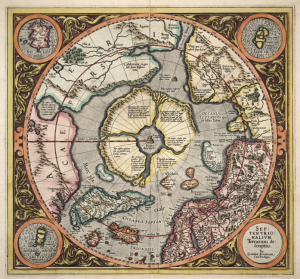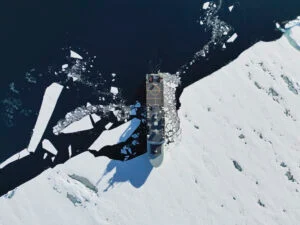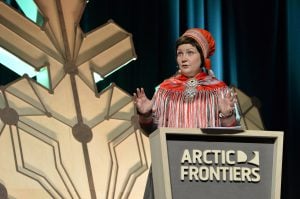
People & Culture
Kahkiihtwaam ee-pee-kiiweehtataahk: Bringing it back home again
The story of how a critically endangered Indigenous language can be saved
- 6310 words
- 26 minutes
This article is over 5 years old and may contain outdated information.
People & Culture

Canadian immigrants Arnold Witzig and Sima Sharifi founded the Arctic Inspiration Prize in 2012 to celebrate the North’s achievements and ingenuity. The organization awards up to $3 million annually to projects that foster and implement northern knowledge, and on Feb. 12, 2019, the winners of the 2018 Arctic Inspiration Prize will be announced at an award ceremony in Whitehorse. From traditional food networks to youth literacy initiatives, here’s a look at some of the past grand-prize winners.
2012 winner
Team members: Lucassie Arragutainaq, Bert Dean, Alan Everard, James Ford, Morgan Ip, Jack Kabvitok, Lola Sheppard, Mason White (team leader)
Country foods are important to the physical, mental, social and economic health of Arctic peoples and communities. The Arctic Food Network won the $1-million prize (shared with three other teams) to help develop its network of cabins, sheds and other supporting infrastructure to strengthen traditions of hunting and sharing food in northern communities. The network will lead to the acquisition, storage, preparation, distribution and celebration of country food, and other locally-sourced food.
2012 winner
Team members: Cayla Chenier, Kim Crockatt (team leader), Graeme Dargo, George Dunkerley, Sue Folinsbee, Brendan Griebel, Adriana Kusugak, Pujjuut Kusugak, Quluaq Pilakapsi, Shelley Tulloch, Gloria Uluqsi, Anna Ziegler
The social and economic costs of low literacy are monumental. In Nunavut, low literacy rates result in nearly half of the working-age population struggling with serious challenges and lacking the literacy skills needed to thrive in today’s society. The Nunavut Literacy Council won the $1-million prize (shared with three other teams) for their knowledge-to-action plan to embed literacy into high-quality, culturally-based programming for the benefit of individuals, families and communities across the North.
2012 winner
Team members: Deneen Allen, Stephen Ellis, Dora Enzoe (team leader), Gloria Enzoe, Mike Filipowitsch, Larry Innes, Erica Janes, Steven Nitah, Mike Palmer, Francois Paulette, Council of the ?utsël K’e Dene First Nation, Thaidene Nëné Negotiations Advisory Committee
For over 40 years the ?utsël K’e Dene First Nation, a small Chipewyan community of just over 300 people located on the south shore of Great Slave Lake in Northwest Territories, has been advancing an initiative to protect a more than 30,000-square-kilometre area of their homeland called Thaidene Nëné, the “Land of the Ancestors.” The Thaidene Nëné Initiative received the $1-million prize (shared with three other teams) to contribute to the stewardship, protection and co-management of the proposed national park reserve.
2013 winner
Team members: Peter Geikie, Kevin Kablutsiak, Heather Ochalski, Mary Simon (team leader).
Low school attendance is a serious problem in Inuit communities across Canada. Involving parents and caregivers in their children’s education and confidently engaging them in the school system is critical to improving education outcomes in the North. The National Committee on Inuit Education and the Amaujaq National Centre for Inuit Education received the $1-million prize (shared with two other teams) for their plan to mobilize parents through media support, regional roundtables and conferences, community-targeted initiatives and the creation of parent toolkits with tips on how parents can support their children’s education.
2013 winner
Team members: Tony Andersen, Dorothy Angnatok, Trevor Bell, Christina Goldhar, Isabella Pain (team leader), Carla Pamak, Dan Pottle, Tom Sheldon, Darryl Shiwak, Katie Winters.
Access to culturally suitable and environmentally adapted housing is one of the most important issues facing Northerners across Canada, and particularly in the Nunatsiavut region of northern Labrador. SakKijânginnatuk Nunalik received the $1-million prize (shared with two other teams) for their plan to use local Inuit knowledge, professional assessments and literature reviews to build and monitor Nunatsiavut’s first sustainable, multi-unit residential dwelling and establish a prototype for Northern housing development that addresses the changing northern climate, infrastructure requirements and Inuit housing needs.
2014 winner
Team members: Jane Dragon, Jeremy Emerson, Gwen Healey, Veronica Johnny, Carmen Logie, Candice Lys (team leader), Kayley Mackay, Nancy MacNeill, Graeme Peters, Teresa Watson, Makenzie Zouboules.
The sexual health of Northern youth is a serious public health concern, with extremely high rates of sexually transmitted infections, teen pregnancy and sexual violence across the territories. Working with an exceptional team of youth, Elders, educators, community-based researchers and artists, FOXY received $1 million for their plan to acknowledge and address the complex determinants of sexual health through school-based workshops, peer leadership retreats and more.
2017 winner
Team Members: Be’sha Blondin, Jean Cardinal, Edna Elias, William Greenland, Rassi Nashalik, Donald Prince, Dr. Nicole Redvers (team leader), Magnolia A. R. Unka-Wool
Indigenous populations, compared to their non-Indigenous peers, are at higher risk for suicide, substance abuse, incarceration and homelessness — more than 90 per cent of the homeless population in the Northwest Territories is Indigenous. The Arctic Indigenous Wellness Project received the $1 million prize for their plan to combine Indigenous cultural education with traditional therapeutic interventions in an urban setting, with the goal of improving the mental health of at-risk Indigenous Peoples.
—with files from the Arctic Inspiration Prize
Are you passionate about Canadian geography?
You can support Canadian Geographic in 3 ways:

People & Culture
The story of how a critically endangered Indigenous language can be saved

People & Culture
In this essay, noted geologist and geophysicist Fred Roots explores the significance of the symbolic point at the top of the world. He submitted it to Canadian Geographic just before his death in October 2016 at age 93.

People & Culture
As the climate heats up, so do talks over land ownership in the Arctic. What does Canadian Arctic Sovereignty look like as the ice melts?

Environment
The uncertainty and change that's currently disrupting the region dominated the annual meeting's agenda